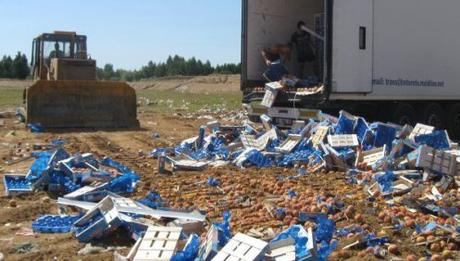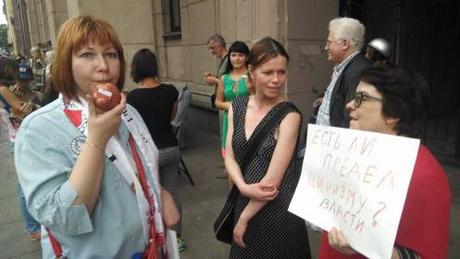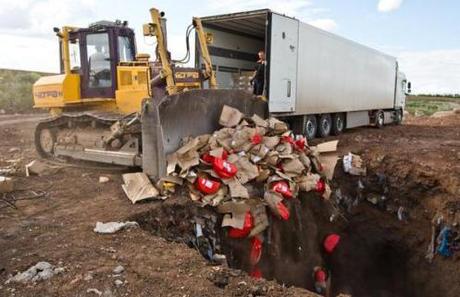
Photo: zloy odessit LiveJournal.
If there is one issue that may signal the slow awakening of Russia’s opposition, perhaps the food issue is most telling. On the 29th of July, President Vladimir Putin signed a decree ordering the confiscation and destruction of banned foodstuffs entering Russia. The executive order has its genesis in the presidential decree banning such foods on the sixth of August 2014.
The results of the new order have been stunning: some Russians had previously believed state television reports that the ban was the results of the West’s refusal to export food to Russia. That illusion has been exposed as a lie. Others, understanding that the ban was an order from the Kremlin, supported the government’s restrictions, believing that Russia was countering the evil West, especially the USA.
In reality the previous ban had done little to stop the import of Western exports, except to create inflation as banned products began to rise in price. Customs officials, at least according to many Russians, were the one’s benefiting from the ban as some of the confiscated food seemingly disappeared into thin air.
Over the past year, food inflation has grown 20.7 percent according to the government’s statistical service. Some products, however, have skyrocketed to much higher levels. The government reported that overall inflation had risen to 15.60 percent by July of 2015.
The Russian public has borne the brunt of the current economic crisis. The Federal State Statistics Service estimates that the percentage of Russians now living under the poverty line rose to 16 percent by the first quarter of this year. If one accepts the government’s claim, then almost 23 million of the Russia population now live in poverty.
Bans or not, many of the products eventually found their way onto store shelves anyway. The presidential decree on destruction of banned food products is aimed at achieving what the previous executive order had failed to accomplish. Thus, this directive: 3. Правительству Российской Федерации незамедлительно установить порядок уничтожения товаров. (Translation: The Government of the Russian Federation will immediately establish a procedure for destruction of goods.)
The public outcry may have surprised the government. Several hundred thousand signatures have been collected in a petition to stop the destruction by Change.org. Online social media, from LiveJournal to Twitter, and from Vkontake to Facebook, reveals that the destruction of food has touched a nerve in a country that has seen hunger firsthand. Public protesters, in small numbers at the moment, are reappearing on Russia’s streets–something virtually unseen for almost two years.

Saint Petersburg, Nevsky street protest. Photo by Константин Куортти.
A popular LiveJournal blogger recently posted a moving message to her government: Я просто хочу нормальной жизни (translation: I Just Want a Normal Life). In that article she begs Mr. Putin to explain how he has personally suffered from the crisis and bans.
Pointedly, she asks: Вы стали меньше есть? Меньше зарабатывать? Меньше ездить по миру? Меньше покупать продукты? Вас сократили что ли? Или, может, вы снизили свои расходы на развлечения в виде походов в театр или гала-ужины? Что вы потеряли? (You eat less? Earn less? Travel less around the world? Buy fewer products? What have you personally cut? Maybe you have reduced entertainment spending at the theater or at gala dinners? What have you lost?)
The conclusion: Я знаю ответ на этот вопрос. И вы знаете. НИЧЕГО! (I know the answer to this question. And you know. NOTHING!)
So, is this growing food opposition only an isolated issue to just a few, or it is a legitimate cause for concern? The well respected Russian polling organization, Levada Centre just released interesting data revealing that almost half of Russians are opposed to the incineration of foodstuffs, and the bleaching and then bulldozing of meat. While some 68 percent (lower than previous polls) still agree with banning Western products, 48 percent do not agree with the government’s order to destroy foodstuffs. Instead, the most common reaction of those polled thought that confiscated food should be used to support orphanages and homeless shelters.
In regards to the Russian president, perhaps a telling sign is the resurgence of a title for Mr. Putin not often seen in public discourse since massive street protests in 2011. It is a one word description: царь (Tsar or Caesar).
One Russian twitter account posted: Страна прошла большой путь: от “НЕ ПИТЬ” — при раннем Горбачеве до “НЕ ЕСТЬ” — при позднем Путине. (The country has come a long way. From “DON’T DRINK” under Gorbachev, to “DON’T EAT” under Putin.)

Dutch cheese from the Netherlands is bulldozed and buried. Twitter photo: Уголок циника (Corner Cynic)
Another mixed the secretive burials of soldiers killed in Ukraine with the burial of cheese by tweeting: Россия – это такая страна, где солдат хоронят тайком и со стыдом, а сыр – демонстративно и с гордостью. (Russia-the kind of country where soldiers are buried secretly, but cheese is buried defiantly and with pride.)
The confiscation of banned products is not only an issue at border entry points. Last week Russian inspectors cited French grocery retailer Auchan for selling banned foodstuffs. Russian health inspectors claim to have discovered DNA from foreign pigs in ground pork products on shelves. Auchan, one of the largest supermarket chains in Russia, has promised to remove any products that violate the ban.
With food prices so high, how does the average Russian feel about their immediate economic future? According to the Moscow based unit of Nielsen Research, the Russian Consumer Confidence Index fell to a record low of 72 points in the first quarter of 2015, down seven points from the previous quarter. Yet, even amid all the ire, humour is never too far around the corner. A popular joke is to call someone a “Parmesan” (as in cheese-head), a play from the Great Patriotic War (WWII) labeling of volunteer guerrilla fighters as Russian partisans.
Despite all the recent Kremlin talk of Washington being controlled by the Illuminati, Russia continues to buy U.S. Treasury bonds, adding $1.4 billion in June, the same amount as May (source: U.S. Treasury). Russia currently holds some $72 billion in U.S. government bonds.
Finally, for those traveling to Russia soon, be aware that over-zealous customs officials are reportedly confiscating personal food items by travelers found in luggage and carry-on bags. This is a violation of the presidential decree, but is happening in spite of the illegality of the enforcement. If you plan on taking food items with you, it might be a good idea to carry a printed copy of the decree. Specifically you should highlight this section of article 2: Положения настоящего Указа не применяются в отношении товаров, ввезённых физическими лицами для личного пользования…. (The provisions of this Decree shall not apply in respect to goods of private individuals for personal use.)
Meanwhile, if you smell something burning–it is probably the cheese.

